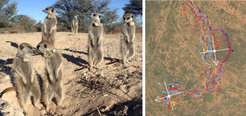Communication, social structure, and collective movement in animal groups

We are seeking a PhD student to join an exciting new research group led by Dr. Ariana Strandburg-Peshkin at the University of Konstanz in Konstanz, Germany. The group seeks to understand the interplay among communication, social structure, and collective movement in animal groups by bringing together behavioral observations and field experiments with emerging movement and acoustic tracking technologies and quantitative analysis tools. The position is fully funded for 3.5 years, and open to students of any nationality.
Background. Recent studies of collective behavior in animal groups have shown that coordinated group movement can emerge if individuals obey surprisingly simple behavioral rules. However, many species live in stable groups structured by long-term social relationships, and these relationships may introduce heterogeneity into the rules individuals employ, with potential consequences for the dynamics and outcomes of collective decisions. Additionally, many species have evolved sophisticated communication systems known to play a role in the coordination of movement. Because animals can actively vary when, how often, and what types of signals they produce, this introduces the possibility for individuals to flexibly, dynamically, and even strategically shape their signaling behavior to alter their interactions with others. Understanding the role such signals play in shaping movement decisions, and conversely how movement dynamics affect signal production, is key to understanding the mechanisms and evolution of collective movement across a wide range of systems.
Position Details. The student will focus on understanding the interplay between communication and collective movement in wild meerkat groups. Research will involve collecting and analyzing combined GPS and acoustic data from entire groups of meerkats, as well as designing and conducting field experiments. The student will conduct field work and collaborate with researchers at the Kalahari Meerkat Project, a long-term field study that has been maintaining and collecting behavioral and demographic data on a habituated meerkat population in the Kalahari Desert, South Africa, for over 20 years. The communication part of the project will be co-supervised by Prof. Marta Manser at the University of Zurich.
Research Community. The student will be integrated within the department of Biology at the University of Konstanz, and it is envisioned that they will also join the International Max Planck Research School (IMPRS) for Organismal Biology, a cooperative doctoral program between the Max Planck Institute for Ornithology and the University of Konstanz. The University of Konstanz and the Max Planck Institute for Ornithology together form a thriving research community representing a global hotspot for collective behavior and animal movement research. The student will also have the opportunity to form connections internationally with collaborators at the University of Zurich and with other researchers at the field site in South Africa. Start date will be between June and September of 2018.
Qualifications. Research in the group involves extensive behavioral biology field work as well as quantitative data analysis using programming. The ideal candidate should have experience in at least one of these areas as well as a positive attitude and enthusiasm for learning the other. Demonstrated ability to engage in independent research is desirable. A collaborative spirit and the ability to work as part of a team are essential. Applicants should have a masters degree in ecology, zoology, or a related subject, however applicants with a demonstrated interest in biology who have an academic background in another scientific field such as physics, mathematics, computer science, or engineering are also encouraged to apply. The working language of the group is English, and German language skills are not a requirement.
Location. Konstanz is a vibrant city located on the border between Germany and Switzerland, on the shores of the Bodensee (Lake Constance). It is easy to get out into the beautiful German and Swiss countryside and the Alps, as well as to neighboring Zurich and Munich.
Keywords collective behavior, communication, decision-making, animal movement, group coordination, meerkats
Main advisor Ariana Strandburg-Peshkin, University of Konstanz
